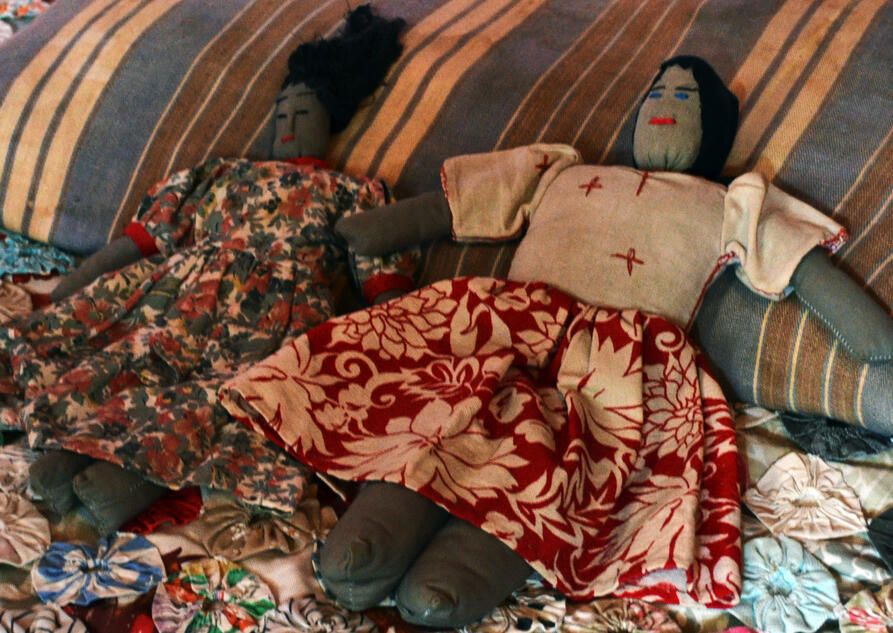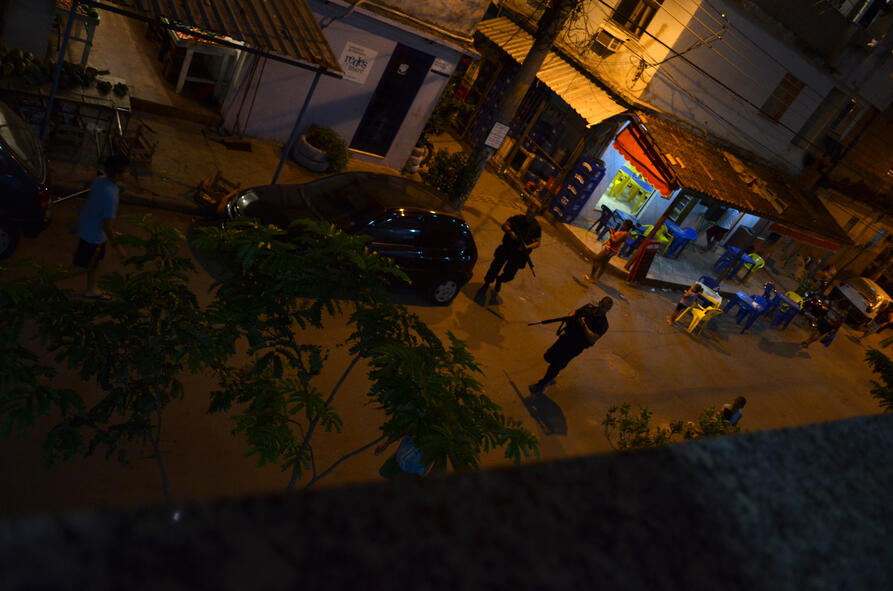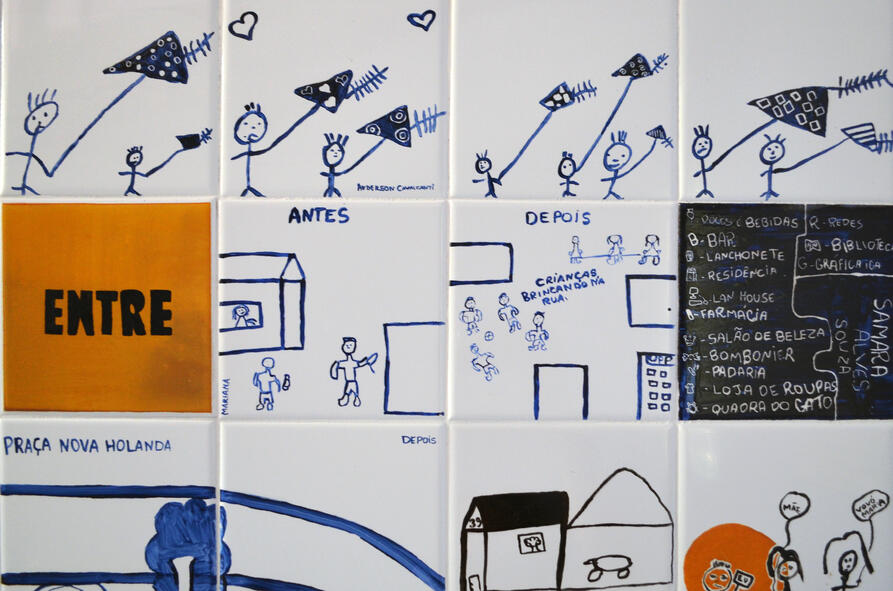
Empowerment of women in Rio's favelas
The favelas of Brazil have reappeared lately in the global media because of the Football World Cup in Rio de Janeiro.They were also in the spotlight when the Brazilian army began their occupation of a complex of favelas in Rio de Janeiro called Maré.
The picture shown by the mainstream media is one of the favelas being more or less uncontrolled warlike zones without any law and order, is leaving a very limited and sometimes even false impression of the life in the favelas. While gang and drug related issues is a big problem, the authorities are part of the problem, committing human rights violations themselves.
And even less known, the favelas also have another side, characterised by a rich and inspiring cultural life, a long history and many locally based social movements and rights based initiatives, which originate in the struggle for the return of democracy in Brazil.
Amnesty International, in partnership with local civil based organisations, have been working closely with a group of women in the favelas during the last year.
The project is led by Amnesty International Brazil and supported from the International Human Rights Education Centre as part of the Education, Empowerment, Justice Programme and this article is based on the impressions of a project visit made by the International Human Rights Education Centre in april 2014.
The picture shown by the mainstream media is one of the favelas being more or less uncontrolled warlike zones without any law and order, is leaving a very limited and sometimes even false impression of the life in the favelas. While gang and drug related issues is a big problem, the authorities are part of the problem, committing human rights violations themselves.
And even less known, the favelas also have another side, characterised by a rich and inspiring cultural life, a long history and many locally based social movements and rights based initiatives, which originate in the struggle for the return of democracy in Brazil.
Amnesty International, in partnership with local civil based organisations, have been working closely with a group of women in the favelas during the last year.
The project is led by Amnesty International Brazil and supported from the International Human Rights Education Centre as part of the Education, Empowerment, Justice Programme and this article is based on the impressions of a project visit made by the International Human Rights Education Centre in april 2014.
Publisert:
21. jul 2014, kl. 14:24
|
Sist oppdatert:
10. nov 2017, kl. 09:16
Many violations and a lot of inspiring initiatives
The Máre complex is home to 132.000 people living in 16 communities. Maré exists as a collection of slums and informal settlements located close to one of the main routes connecting the city centre of Rio de Janeiro with the international airport. The history of Maré goes far back in time, beginning when settlements were made partly as construction workers and their families needed places to live when developing much of the infrastructure of Rio de Janeiro. In Maré there is even a local museum, an initiative made not to forget the history, the roots and the identity of the people living here.
In the building of the local organisation founded by inhabitants from Maré, ‘Redes de Desenvolvimiento da Maré', a children’s library has been created with donated and collected books. There are initiatives such as courses to prepare young people for university access, and a photo school where young people learn to create impressive pieces of photo art using only old cans, gaffe tape and photo paper instead of expensive cameras. Another group is emerging as journalists, publishing a local newspaper which helps to create awareness about social issues and human rights in Maré.
There is also an initiative to map and name the streets of the favelas through democratic decision making processes in the neighbourhoods, and to honour some of the people who have made a special effort for the community. The street names are written on the same kind of tiles as the children are using to tell their stories on.
The situation of the inhabitants of Maré today, however, is not at all easy. People are heavily affected by the ongoing violent conflicts between the authorities, drug dealers and gangs as well as the common human rights violations and harassment committed by the police, by corruption, by general poverty related issues and issues of domestic violence, to mention some.
At the time of our visit, the military had just entered with a heavy occupation of Maré, with 2.700 soldiers patrolling the streets. The occupation was allegedly made to gain control of the favelas which were dominated by the “law” of the drug dealers and gangs, but the timing of the occupation was also remarkably related to the upcoming World Cup.
The general feeling among people in Maré that we spoke to was that the conditions had become more stable after the occupation. There were no longer gun fights from the roof of the school building, located between two drug dealer districts. These gun fights were hindering the children from attending school. Instead there were now reports of violations being carried out by the military, as well as the three different police units active in the area.
They also mentioned a feeling that they expected the current state to change again after the end of the world cup in July, where the media attention will disappear from Brazil, and the military possibly pulling out again.
Women and empowerment
As in many other places, here too the women and children are especially vulnerable. At the same time, and in spite of the gender roles in a highly male oriented community, women have a special position that might allow them to take on a role as mediators and facilitators in times of conflict. While they are usually not in a position to take direct positions of power, they can engage in ways that men would not be able to. Due to the very internalised gender roles and honour codes, men will easily be perceived as threats to existing power hierachies.
An old grandmother, sitting with one of her 26 grandchildren, explained how one of her sons had been caught by the police, beaten and locked up in a little room together with a group of other men. She was called in by people from the neighbourhood and went to negotiate with the police. In the end she succeeded to get the key and release the men. She was old and was respected both by the police and by the drug dealers because of her age and because she was a grandmother.
To support empowerment of the women of Maré, Amnesty International Brazil is now working together with her and other women through the pilot project, Tide of Rights, Women’s empowerment in Maré,
The project is carried out in close partnership with Redes de Desenvolvimiento da Maré and Observatorio de Favelas, which is another local civil based organisation founded by people from Maré. An organisation working with research and documentation on social and rights based issues. The history of the organisation dates back to the democracy movement in the 1980’s, where the current director Eliana Silva was active.
For the women participating, the project has been an educational exploration covering human rights, identity, society - and divisions of society, and a sharing of experiences, leading to higher levels of self esteem and as a result higher confidence that the conditions can eventually be changed for the better.
For these women, Maré is not only a symbol of the hopelessness, the despair and the fear of the drug dealers and the police. Their stories also evolved around Maré being the symbol of their love, their families and their hopes for the future - their home.
One woman from the group told us that she had once witnessed two young boys being executed by the drug dealers. She explained about the sadness she felt when she was thinking that these boys, as well as their executioners were all sons of Maré.
Another described crying when she had lost everything, her job and her home and was without money. But here in Maré she had struggled to build a new life for herself and young son, so now they could manage life themselves.
Allowing these women to empower themselves with knowledge, skills and confidence through human rights education, will help them to be able to engage more actively in debates and negotiations of the communities and will help them to be able to take a more active position in influencing the human rights conditions in Maré, and to create a life of dignity.



The Máre complex is home to 132.000 people living in 16 communities. Maré exists as a collection of slums and informal settlements located close to one of the main routes connecting the city centre of Rio de Janeiro with the international airport. The history of Maré goes far back in time, beginning when settlements were made partly as construction workers and their families needed places to live when developing much of the infrastructure of Rio de Janeiro. In Maré there is even a local museum, an initiative made not to forget the history, the roots and the identity of the people living here.
In the building of the local organisation founded by inhabitants from Maré, ‘Redes de Desenvolvimiento da Maré', a children’s library has been created with donated and collected books. There are initiatives such as courses to prepare young people for university access, and a photo school where young people learn to create impressive pieces of photo art using only old cans, gaffe tape and photo paper instead of expensive cameras. Another group is emerging as journalists, publishing a local newspaper which helps to create awareness about social issues and human rights in Maré.
There is also an initiative to map and name the streets of the favelas through democratic decision making processes in the neighbourhoods, and to honour some of the people who have made a special effort for the community. The street names are written on the same kind of tiles as the children are using to tell their stories on.
The situation of the inhabitants of Maré today, however, is not at all easy. People are heavily affected by the ongoing violent conflicts between the authorities, drug dealers and gangs as well as the common human rights violations and harassment committed by the police, by corruption, by general poverty related issues and issues of domestic violence, to mention some.
At the time of our visit, the military had just entered with a heavy occupation of Maré, with 2.700 soldiers patrolling the streets. The occupation was allegedly made to gain control of the favelas which were dominated by the “law” of the drug dealers and gangs, but the timing of the occupation was also remarkably related to the upcoming World Cup.
The general feeling among people in Maré that we spoke to was that the conditions had become more stable after the occupation. There were no longer gun fights from the roof of the school building, located between two drug dealer districts. These gun fights were hindering the children from attending school. Instead there were now reports of violations being carried out by the military, as well as the three different police units active in the area.
They also mentioned a feeling that they expected the current state to change again after the end of the world cup in July, where the media attention will disappear from Brazil, and the military possibly pulling out again.
Women and empowerment
As in many other places, here too the women and children are especially vulnerable. At the same time, and in spite of the gender roles in a highly male oriented community, women have a special position that might allow them to take on a role as mediators and facilitators in times of conflict. While they are usually not in a position to take direct positions of power, they can engage in ways that men would not be able to. Due to the very internalised gender roles and honour codes, men will easily be perceived as threats to existing power hierachies.
An old grandmother, sitting with one of her 26 grandchildren, explained how one of her sons had been caught by the police, beaten and locked up in a little room together with a group of other men. She was called in by people from the neighbourhood and went to negotiate with the police. In the end she succeeded to get the key and release the men. She was old and was respected both by the police and by the drug dealers because of her age and because she was a grandmother.
To support empowerment of the women of Maré, Amnesty International Brazil is now working together with her and other women through the pilot project, Tide of Rights, Women’s empowerment in Maré,
The project is carried out in close partnership with Redes de Desenvolvimiento da Maré and Observatorio de Favelas, which is another local civil based organisation founded by people from Maré. An organisation working with research and documentation on social and rights based issues. The history of the organisation dates back to the democracy movement in the 1980’s, where the current director Eliana Silva was active.
For the women participating, the project has been an educational exploration covering human rights, identity, society - and divisions of society, and a sharing of experiences, leading to higher levels of self esteem and as a result higher confidence that the conditions can eventually be changed for the better.
For these women, Maré is not only a symbol of the hopelessness, the despair and the fear of the drug dealers and the police. Their stories also evolved around Maré being the symbol of their love, their families and their hopes for the future - their home.
One woman from the group told us that she had once witnessed two young boys being executed by the drug dealers. She explained about the sadness she felt when she was thinking that these boys, as well as their executioners were all sons of Maré.
Another described crying when she had lost everything, her job and her home and was without money. But here in Maré she had struggled to build a new life for herself and young son, so now they could manage life themselves.
Allowing these women to empower themselves with knowledge, skills and confidence through human rights education, will help them to be able to engage more actively in debates and negotiations of the communities and will help them to be able to take a more active position in influencing the human rights conditions in Maré, and to create a life of dignity.



